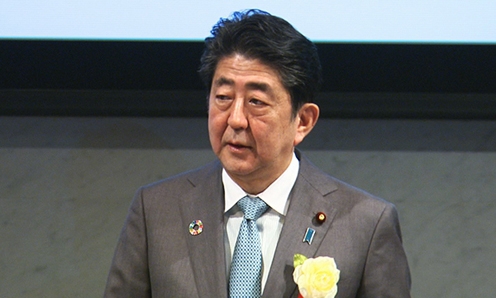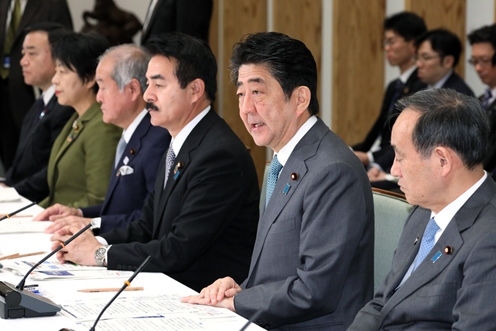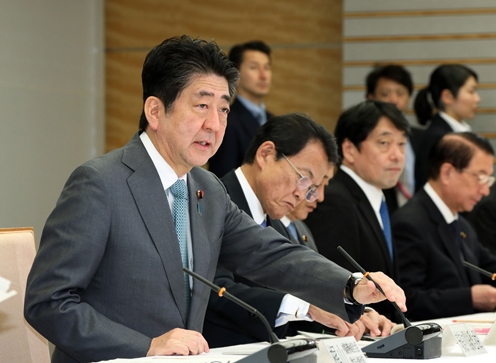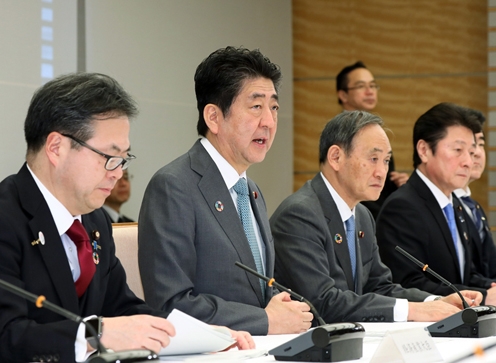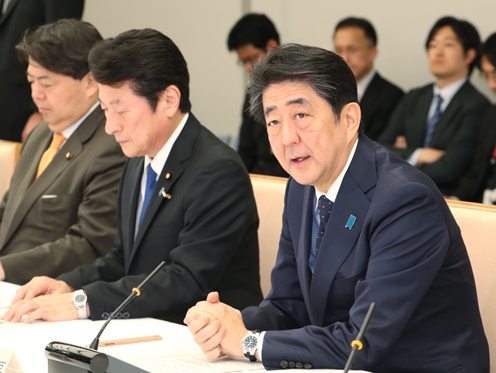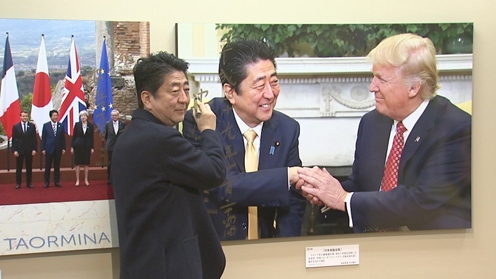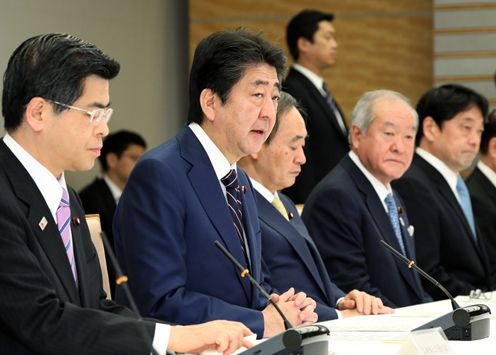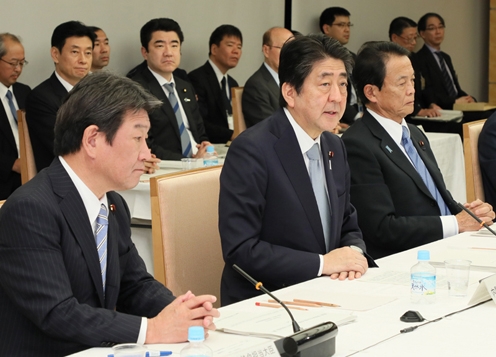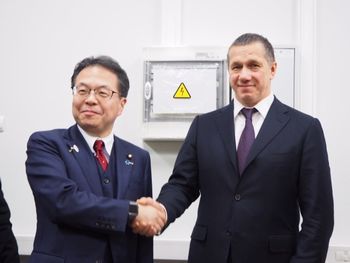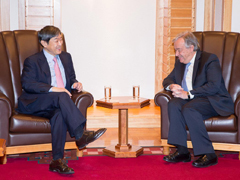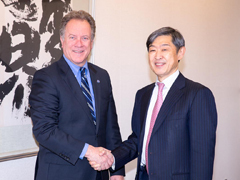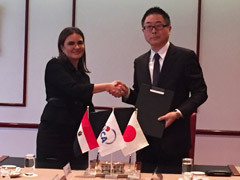Meeting of Councillors of Keidanren (Japan Business Federation)
Cabinet Secretariat, Tuesday, December 26, 2017
[Provisional Translation]
On December 26, 2017, Prime Minister Shinzo Abe attended a Meeting of Councillors of Keidanren (Japan Business Federation) held in Tokyo.
The Prime Minister said in his address,
“Today actually marks exactly five years since the inauguration of the second Abe Cabinet. In other words, today is the fifth anniversary of Abenomics. I am delighted that, on this truly auspicious day, I have been invited to attend this annual Meeting of Councillors of Keidanren. I am sure it is completely by chance. I would nevertheless like to express my gratitude.
During these five years, we have placed top priority on the economy, and exerted our full efforts in various reforms, such as corporate tax reform and corporate governance reform. As a result, Japan’s economy has shown positive growth for seven consecutive quarters. Given that such a level of economic expansion has not occurred since the January-March 2001 quarter, I believe, we are seeing such strong level of growth for the first time in this century.
We have also witnessed a major shift from negative business sentiment before the change in government to positive business conditions. In the recently released Short-Term Economic Survey of Enterprises in Japan (Tankan) of the Bank of Japan, business conditions for large enterprises and manufacturing were at the highest level since December 2006 before the global financial crisis.
December 2006 was indeed during the first Abe administration, not that I am boasting. I would also like to note just in case that, looking back, at that time too, Japanese companies registered record high earnings. So the economy is the best it has been in 11 years.
Meanwhile, when looking at companies of all sizes, including small and medium enterprises (SMEs), and all industries, the economy is in fact the best it has been for an even longer period. We are actually seeing such a strong economy for the first time in 26 years since the economic bubble. This means that currently business sentiment is good not only at large enterprises but also at SMEs. This is the major difference from 2006.
Under Japan’s prolonged deflation, in particular, SMEs in the non-manufacturing industries, such as the service industry, have consistently recorded negative business sentiment in the Bank of Japan’s Tankan for more than 20 years after the collapse of the bubble economy. However, business sentiment has become positive with Abenomics and has basically remained positive for almost three years.
In other words, while at first glance the current economic recovery appears the same as that at the time of the first Abe Cabinet, of course it looks the same as the Prime Minister is also the same, in substance they are totally different. The wave of economic recovery is not limited to large enterprises and manufacturing, and is also spreading to SMEs and enterprises in the non-manufacturing industries. The positive economic cycle that Abenomics has been aiming for has truly come into being during the last five years. I believe this is a testament to the widespread economic recovery.
When we look at employment and wages, the difference between now and 2006 is even clearer.
Although the overall ratio of active job openings to applicants was slightly over 1.0 in 2006 as well, it was around 0.6 in Hokkaido and in Aomori, Kochi, and Okinawa, the ratio was only a little over 0.4. The situation was severe in prefectures. Now, the ratio exceeds 1.0 in all 47 prefectures, in every corner of Japan. Such a national improvement in the employment situation was not seen even during the period of rapid economic growth. Under such circumstances, the ratio of active job openings to applicants for regular employees, which was around 0.6 in 2006, currently exceeds 1.0 for the first time since statistics began to be kept.
In regard to wages, an increase of about 2% has been achieved annually for four consecutive years according to a survey by the Japanese Trade Union Confederation (RENGO). It also exceeds that of around 2006, and is the highest level in this century.
As a result of the economic recovery, anyone can work if they have ambition. And if they work hard, their wages will rise. This will lead to further increases in investment and consumption. The warm winds of economic recovery will reach SMEs and small businesses and members of the service industry, creating the next round of economic growth. This positive economic cycle is the driving force of the economic recovery through Abenomics. First, I would like to take this opportunity to express my profound gratitude to all the members of Keidanren for the expansion of employment and wage increases over the last five years.
Having said that, as this intuitive audience has probably have begun to notice, in order to soon realize an exit from deflation, which is a longstanding issue, we must continue to make this positive economic cycle even more powerful in 2018 as well. To that end, I would like to make one request. I am very sorry to make similar remarks every year, but I would like to request Chairman Sakakibara, Chairman of the Board of Councillors Iwasa, and all those in attendance here today to please continue to carry out a strong wage increase next spring, namely, a wage increase of 3% or above.
Oh, it has suddenly become very quiet. Anyway, of course, in order for companies to carry out a wage increase, it is necessary to increase labor productivity. To that end, the Government has raised the new flag of a revolution in productivity, and has decided to mobilize a variety of policies such as taxation, budget, and regulatory reforms.
Proactive investment in innovations, including artificial intelligence (AI), Big Data, robots, and IoT, promote a major transformation in business models, beyond bringing about more than just greater efficiency and labor-saving. By directly linking with the potential needs of individuals and companies, unprecedentedly innovative businesses and services are now steadily being developed all over the world.
By creating completely new added value in the era of Society 5.0, we will dramatically raise productivity. By 2020, Japan will realize, ahead of the rest of the world, this kind of a revolution in productivity that will be comparable to previous industrial revolutions. We recently compiled a policy package to achieve this. We will establish a regulatory sandbox to be able to take on new business challenges with innovative ideas without being bound by current regulations.
For companies that carry out a wage increase of 3% or more and, to that end, thoroughly make investments, we will decrease the corporate tax burden to the OECD average of 25%. In addition, for companies undertaking bold endeavors in adopting innovative technology, it will be dropped to 20%. Nowadays, the taxation reform in the United States has been a topic of interest. However, even if the federal tax drops to 21%, there is also the state’s corporate tax, so the total is a corporate burden of about 28%. The Abe Cabinet has reduced the corporate tax rate by 7% over the last five years, achieving the rate under 30%. Moreover, in the tax system aimed at this revolution in productivity, we will further reduce the corporate tax burden including national and local taxes to 20% at once. This is truly a revolutionary policy. To this end, Minister of Finance Aso made a bold decision, jumping down from the renowned high-rise stage at Kiyomizu Temple in Kyoto, but with a parachute.
At the same time, though this probably does not apply to any of you in attendance today, there may be companies that have achieved record-breaking earnings but are reluctant to invest in equipment or human resources. If we find such companies, we will stop preferential treatment for them, including tax reduction for research and development. Our methods of placing focus are also revolutionary.
What is needed now is a more aggressive approach in management. ‘If you want to protect yourself, there is no choice but to attack.’ These are the words of Yoshiharu Habu, the only individual ever to simultaneously hold seven major professional shogi (Japanese chess) titles. These words resonate with me this year. I hope that all of you will completely rid yourself of a deflation mindset next year, and make use of this opportunity to pursue the challenges of making bold investments for productivity improvement.
Next year the work style reform will be the biggest political topic. With cooperation from the members of Keidanren, and based on the agreement of both the business community and labor, for the first time we will introduce regulations on long work hours that come with penalties. Securing a work-life balance in itself is a powerful weapon for a revolution in productivity. In order to both shorten working hours and advance work style reform, it is necessary to make capital investments aimed at improving labor productivity. I would like to make next year the first year of Japan’s revolution in productivity by realizing the trinity of proactive and bold investment, work style reform, and a wage increase of 3% or more.
In Japan, where the declining birthrate and aging population are rapidly advancing, we will also advance a revolution in human resources development along with the revolution in productivity. We will be able to fully unleash the potential of each and every Japanese individual. Creating that kind of society is an urgent issue.
In order to take on the challenges of the major reforms, this year we also accepted the challenge of dissolving the House of Representatives and having a general election. We received the confidence of the people, and along with reviewing the uses of the consumption tax, with the strong cooperation of the business community, we have decided to boldly invest in our children’s futures, including making early childhood education free, using the permanent source of funds of two trillion yen. I would like to take this opportunity to once again express my gratitude for your cooperation.
Further, towards next summer, we will advance consideration of enhancing recurrent education (continuing education) through the use of the employment insurance system, and are determined to conduct major reform of Japan’s social security system to orient it to all generations.
This month the Japan-EU Economic Partnership Agreement (EPA) was concluded after nearly five years of negotiations. Last month, the TPP11 reached an agreement at the ministerial level. An economic zone based on free and fair rules will be expanded across the world. This offers a major opportunity for Japanese companies that provide high quality goods and services.
With our major goal being 2020, when the Olympic and Paralympic Games will come once again to Japan, we will conduct major socioeconomic reforms in Japan. I believe that, having our sights on the future, this year we have made a major step forward towards building a new country. When the New Year arrives, it will be 2018, leaving only two more years. We do not have much time to spare. Therefore, next year we will continue to persistently pursue reform, reform, and reform.
As the market adage goes, ‘the years of the monkey and the rooster are years of upheaval, while the year of the dog is a year of laughter.’ I will not go into too much detail, but this past year, the Year of the Rooster, was certainly a year of upheaval for me. I truly hope that next year, the Year of the Dog, will be a year that brings laughter throughout Japan. I wonder if, in fact, at this Meeting at the end of next year, we will all really be smiling. I believe that depends on to what extent, both the Government and the business community boldly tackle the challenges of reforms over the next year. In the coming year, let us both work hard. I would like to conclude my remarks by expressing my wish that next year, the Year of the Dog of laughter, will be a wonderful one for all of you. Thank you very much for your invitation today, and also for your kind attention.”
Sustainable Development Goals (SDGs) Promotion Headquarters
Cabinet Secretariat, Tuesday, December 26, 2017
[Provisional Translation]
On December 26, 2017, Prime Minister Shinzo Abe held the fourth meeting of the Sustainable Development Goals (SDGs) Promotion Headquarters at the Prime Minister’s Office.
During the meeting, discussions took place on the SDGs Action Plan 2018, the recipients of the first Japan SDGs Award, and other matters.
Based on the discussions, the Prime Minister said,
“Through promoting the SDGs, Japan will create new enterprises and employment, and become the first in the world to materialize a future vision for a prosperous and vibrant society that can be achieved amidst the declining birthrate, aging population, and globalization. To that end, we have decided to develop an SDGs model, which is distinct to Japan, and today formulated the SDGs Action Plan 2018 for exerting all of our efforts to address the eight priority areas identified in the SDGs Implementation Guiding Principles, which was determined at the second meeting of this Headquarters. In this Action Plan, we raise the following three points as the major pillars that characterize Japan’s SDGs model.
The first pillar is the joint promotion of Society 5.0 by the public and private sectors, which is closely linked to the SDGs. Specifically, by the middle of next year, we will formulate measures that further encourage corporate efforts, such as an SDGs business promotion initiative, including support for venture businesses, as well as investment promotion mechanisms, and an international roadmap for science, technology and innovation that contributes to the SDGs.
The second point is regional vitalization driven by the SDGs. By implementing the newly launched local government SDGs model programs and the support measures related to regional vitalization in a comprehensive manner, the relevant ministries and agencies will work as one to support such initiatives.
Third is the empowerment of future generations, and women, who promote the SDGs. We will advance the work style reform and the active participation of women, and put efforts into developing human resources, who will take the lead to achieve the SDGs. We will also take a leading role in international cooperation in areas such as health, including universal health coverage that is a part of the ‘Japan brand,’ education, disaster risk reduction, and women’s empowerment.
I would also like to make full use of opportunities, such as the G20 Summit in 2019 and the 2020 Tokyo Olympic and Paralympic Games, in order to transmit Japan’s initiatives to the world, when its attention will be focused on Japan. I would like the relevant Cabinet members to focus on the implementation of the Action Plan, taking into account the three pillars, by the next meeting that is planned for the middle of next year, and to proceed with further crystallizing and expanding the efforts to promote the SDGs.”
Headquarters for Promoting Decentralization Reform
Cabinet Secretariat, Tuesday, December 26, 2017
[Provisional Translation]
On December 26, 2017, Prime Minister Shinzo Abe held the 11th meeting of the Headquarters for Promoting Decentralization Reform at the Prime Minister’s Office.
During the meeting, discussion took place on the measures to address the proposals received from the regions in 2017 and other matters.
Based on the discussion, the Prime Minister said,
“Japan will not have vitality unless its regions do as well. In order to realize a society where the people can feel its prosperity and enjoy secure livelihoods, it is important for each region to build on the distinct features of its designated local areas and develop these areas creatively based on its own ideas. To that end, we must continue to strongly promote decentralization reform that increases regional autonomy and independence.
We gave due consideration to these proposals based on our basic approach to listen carefully to the voices of the regions. As a result, this year we have responded to 90 percent of the proposals received, including those that contribute to the promotion of culture and tourism, support for childrearing, and support for areas affected by natural disasters. I would like all the ministers to exercise strong leadership based on the guidelines determined today to steadily realize each of the measures.”
Ministerial Council on Renewable Energy, Hydrogen and Related Issues
Cabinet Secretariat, Tuesday, December 26, 2017
[Provisional Translation]
On December 26, 2017, Prime Minister Shinzo Abe attended the second meeting of the Ministerial Council on Renewable Energy, Hydrogen and Related Issues at the Prime Minister’s Office.
During the meeting, discussion took place on the formulation of the Basic Hydrogen Strategy (draft); the progress of the Action Plan on Ministry and Agency Collaboration Towards the Expansion of Renewable Energy; and the report on the progress of the Fukushima Plan for a New Energy Society.
Based on the discussion, the Prime Minister said,
“Through innovation, hydrogen energy will become a trump card to solve the issues of energy security and global warming. The Basic Strategy that was determined today serves as a guidepost for Japan to lead the way towards decarbonization in the world by providing hydrogen as a new energy option.
I ask that the measures outlined in the Basic Strategy be swiftly implemented. The Fukushima Plan for a New Energy Society, which is the pioneer of this Basic Strategy, has already begun its activities. In Namie Town, a hydrogen production project of the world’s largest scale, using renewable energy with zero CO2 emissions, started last summer. In 2020, this clean hydrogen made in Fukushima will be used for the Tokyo Olympic and Paralympic Games. We will show the world a new aspect of Fukushima’s recovery as a ‘Reconstruction Olympic and Paralympic Games.’
Japan will lead the world in materializing a hydrogen society. With that determination, I would like to ask Minister Seko and other relevant ministers to engage in a united effort across the Government in accordance with the Basic Strategy.”
Council for Science, Technology and Innovation
Cabinet Secretariat, Monday, December 25, 2017
[Provisional Translation]
On December 25, 2017, Prime Minister Shinzo Abe held the 34th meeting of the Council for Science, Technology and Innovation at the Prime Minister’s Office.
During the meeting, there was a discussion for the planning of an integrated innovation strategy, and there was a briefing on the evaluation results of the research and development (R&D) projects of national importance.
Based on the discussion and briefing, the Prime Minister said,
“Today, Professor Nishimori of Tokyo Institute of Technology introduced issues facing the vitalization of innovation in Japan, and President Matsuo of Nagoya University shared with us some proactive initiatives for university reform in local areas.
In order for Japan to pioneer innovations in the world, we need a consistent, streamlined strategy encompassing everything from basic research to the implementation in society, which is based on a global perspective.
To realize a revolution in productivity looking ahead to 2020 as well, we need to swiftly implement concrete policies, not abstract theory.
To that end, I ask members to work with the relevant ministers in formulating an integrated and concrete innovation strategy by the summer of next year, under the leadership of Chief Cabinet Secretary Suga and Minister Matsuyama.
In particular, we must press forward with reforms of universities, which are expected to play a significant role as centers for introducing innovations.
I would like Minister Matsuyama and Minister Hayashi to work closely in implementing meaningful reform measures including offering priority support from next fiscal year for universities that have received private sector funding and universities that carry out remuneration reform with a focus on junior personnel as well as governance reform, without waiting for the finalization of the strategy.”
58th Press Photo Exhibition 2017
Cabinet Secretariat, Sunday, December 24, 2017
[Provisional Translation]
On December 24, 2017, Prime Minister Shinzo Abe visited the 58th Press Photo Exhibition 2017 being held in Tokyo.
After viewing the photographs, the Prime Minister said,
“I believe this year was a year of examining how to deal with North Korea, which has become an urgent threat. How should we deal with the North Korean threat? How should we deal with the great obstacle of the declining birthrate and the aging population? I dissolved the House of Representatives and embarked on a general election in order to make a breakthrough and to deal with these situations that could be called ‘difficulties.’ This year was an eventful year, and I am glad to be able to end the year with a tremendous win in the general election. I will work to make good on my promises one by one next year. Seeing these photographs, I was reminded that this year was an eventful year.”
Ministerial Council on the Promotion of Japan as a Tourism-Oriented Country
Cabinet Secretariat, Friday, December 22, 2017
[Provisional Translation]
On December 22, 2017, Prime Minister Shinzo Abe held the eighth meeting of the Ministerial Council on the Promotion of Japan as a Tourism-Oriented Country at the Prime Minister's Office.
During the meeting, an exchange of views took place on the basic policy regarding the uses of revenues from the international tourist tax (provisional name) and other matters.
Based on the exchange of views, the Prime Minister said,
“The Abe Cabinet has made intensive efforts, positioning tourism as a pillar of our Growth Strategy and as a trump card for vitalizing local economies. As a result, the number of annual foreign visitors to Japan increased from 8 million people before the inauguration of my administration, to 24 million last year, and at the current pace it is expected to exceed 28 million this year.
However, I have no intention of being content with these numbers. With leading nations in tourism such as Italy and France as our targets, we need to implement highly effective measures toward achieving the goals of 40 million visitors per year by 2020 and 60 million by 2030.
To that end, a decision has been made to establish an international tourist tax, and today, we compiled a basic policy and concrete measures regarding the uses of revenues from this tax.
This new tourism funding will be allocated to advanced, high cost-performance measures in order to turn Japan into a country that people around the world will want to visit. For instance, at our international airports, we will install gates that people can pass through using an instant face recognition system in order to create a more pleasant travel experience. Alongside that, we will make use of reviews of administrative programs to ensure transparency in our activities and have third parties conduct thorough checks.
When I travelled around the country for the recent House of Representatives election campaign, I once again saw firsthand the local areas’ tremendous expectations for tourism. With the right ideas, a local area’s culture or history will be transformed into killer contents that attract tourists from all over the world, and they can be communicated to the world using social media. Tourism creates major opportunities for each local area.
The Government will continue to work together in making every effort to build a new Japan that is a leading tourism nation, based on the principle of doing everything that the Government can possibly do.”
Meeting of the Council on Economic and Fiscal Policy
Cabinet Secretariat, Thursday, December 21, 2017
On December 21, 2017, Prime Minister Shinzo Abe held the 17th meeting in 2017 of the Council on Economic and Fiscal Policy at the Prime Minister's Office.
At the meeting, there was discussion on the Fiscal 2018 Economic Outlook and the Progress of Integrated Economic and Fiscal Reforms.
Based on the discussion, the Prime Minister said,
“First, we held a discussion on future economic and fiscal management based on the Fiscal 2018 Economic Outlook. Amidst ongoing improvements in the employment and income situation this fiscal year, Japan’s economy is seeing the realization of a positive economic cycle marked by improving personal consumption and capital investments. As this positive cycle continues to advance further next fiscal year, we can expect an economic recovery, with a real economic growth rate of 1.8%, which is driven mainly by private sector demand. Seizing the opportunity of these favorable economic conditions, we must carry out the revolutions in productivity and human resources development, toward overcoming our greatest challenge of the declining birthrate and aging population. I would like the relevant ministers to steadily implement the new economic policy package that was approved by the Cabinet recently.
Second, we had a discussion on reform of the drug pricing system. I would like Minister Kato to steadily implement concrete reform policies, while promoting innovation in drug development, in order to realize a balance between reducing the cost burden on the public and improving the quality of medical care. In addition, we also took time to discuss ways to handle land with unknown owners. A large number of inheritances will occur as our population ages, and there are fears that going forward the amount of land with unknown owners could increase. I would like to ask the relevant ministers including Chief Cabinet Secretary Suga and Minister Ishii to cooperate with each other in formulating and implementing comprehensive measures.
Third, we approved the revised 2017 Reform Schedule for the Plan for Economic and Fiscal Revitalization. I would like the relevant ministers to follow the Reform Schedule and steadily implement the reforms, while advancing visualization of reforms thoroughly and expanding it, and promoting and scaling up best practices and excellence.”
Mr. Seko, Minister of Economy, Trade and Industry, and Minister for Economic Cooperation with Russia, Visits the Russian Federation
METI, Wednesday, December 20, 2017
On December 18(Mon.) and 19(Tue.), 2017, Mr. Hiroshige Seko, Minister of Economy, Trade and Industry, and Minister for Economic Cooperation with Russia, visited Vladivostok, the Russian Federation. He attended an event titled "Japan Investor’s Day," the first effort organized by H.E. Mr. Yuriy Petrovich Trutnev, Deputy Prime Minister and Presidential Plenipotentiary Envoy to the Far Eastern Federal District of the Russian Federation, and the Ministry of the Development of the Russian Far East. In addition, he held a meeting with Deputy Prime Minister Trutnev.
Following this, Minister Seko visited the facilities at which Japan-Russia Far East cooperative projects are advancing, such as Hokuto Rehabilitation Center, jointly established by Hokuto Hospital and JGC Corporation, under preparation for its inauguration in 2018, an exhibition of model homes promoting the sale of wooden houses in Russia, and an automobile assembly plant operated by Mazda Sollers Manufacturing Rus, and also toured other facilities related to a port harbor and a railway, which will be important infrastructures for Japanese companies in future business activities.
1. Meeting with Deputy Prime Minister Trutnev (December 18)
Minister Seko held a meeting with Deputy Prime Minister Trutnev, and both sides agreed on further development of Japan-Russia cooperation in the Far East region in advance of the visit of Prime Minister Abe to Russia scheduled in May 2018 and the Eastern Economic Forum in September 2018.
2. Attending the Japan Investor's Day(December 18)
Minister Seko attended the Japan Investor's Day, the first effort organized by Deputy Prime Minister Trutnev and the Ministry of Development of the Russian Far East. In the beginning of the plenary meeting, he explained many achievements in the Far East region brought about by Japan-Russia cooperation under the eight-point cooperation plan in certain fields, e.g., medical care, urban development, energy and infrastructure. He also proposed that both countries should advance the cooperation placing emphasis on three fields for further cooperative development:[ⅰ]development of the agriculture, forestry and fisheries industry, [ⅱ]development of energy infrastructures, and [ⅲ]improvement of infrastructures for exports to the Asia-Pacific region, and that they should strive to both support businesses in the field of finance and to improve business environments.
3. Touring facilities and sites at which Japan-Russia Far East cooperation is advancing(December 19)
Minister Seko visited facilities at which Japan-Russia Far East cooperative projects are advancing, such as Hokuto Rehabilitation Center, jointly established by Hokuto Hospital and JGC Corporation, under preparation for its inauguration in 2018, an exhibition of model homes promoting the sale of wooden houses in Russia, and an automobile assembly plant operated by Mazda Sollers Manufacturing Rus, and also toured other facilities related to a port harbor and a railway, which will be important infrastructures for Japanese companies in future business activities.
JICA President Kitaoka Holds Talks With UN Secretary-General Guterres
JICA, Friday, December 22, 2017
JICA President Shinichi Kitaoka met with U.N. Secretary General António Guterres in Tokyo on Dec. 14.
Mr. Kitaoka and Mr. Guterres began by lauding the close partnership between JICA and Mr. Guterres maintained since he was the U.N. High Commissioner for Refugees. They then had a wide-ranging discussion on topics including development issues in various parts of the world including South Sudan and Myanmar, as well as reform of the U.N. development system. They shared the view and understanding that the U.N. plays an important role in solving various problems in the international community and that they all should stand together on the basis of trust.
JICA will continue strengthening its partnership with the U.N. and contribute to the development of the international community.
JICA President Kitaoka Holds Talks With UN World Food Programme Head Beasley
Cabinet Secretariat, Friday, December 22, 2017
On Dec. 13, JICA President Shinichi Kitaoka held talks with U.N. World Food Programme Executive Director David Beasley at JICA Headquarters in Tokyo.
Mr. Kitaoka began by expressing his respect for the significance and effectiveness of emergency food aid carried out by the WFP. In their conversation, Mr. Kitaoka and Mr. Beasley agreed that as the population of people without enough to eat, which had been on the decline, began increasing in 2016, extremist groups had begun expanding around the world, and that food security in such regions is essential to global stability. They also agreed to closely collaborate on the WFP's emergency food aid and JICA's development cooperation.
JICA will strengthen its strategic partnership with WFP that leverages their respective strengths and further contribute to the world's food security and stability.
Signing of Grant Agreement with Egypt: Strengthening practical education at the Egypt-Japan University of Science and Technology through the provision of education and research equipment
Cabinet Secretariat, Friday, December 22, 2017
On December 18, the Japan International Cooperation Agency (JICA) signed a grant agreement with the Government of the Arab Republic of Egypt in Tokyo, Japan, to provide grant aid of up to 993 million yen for the Project for Procurement of Education and Research Equipment for Egypt-Japan University of Science and Technology (E-JUST) (Phase 2).
This project will provide education and research equipment to the Faculty of Engineering, which was established in September 2017 at E-JUST, which is located in Borg El Arab, Alexandria Governorate, Egypt.
There is a high level of esteem in Egypt for Japanese technology, and for the diligence, discipline and spirit of cooperation of the Japanese people, and the Government of Egypt desired to implement Japanese-style education to train human resources with such traits. This project will be implemented under the framework of the Egypt-Japan Education Partnership (EJEP) which was agreed between Japan and Egypt during a trip to Japan by President Abdel Fattah el-Sisi in February 2016 to provide comprehensive support incorporating the merits of Japanese education for the entire educational system of Egypt.
E-JUST contributes to the improvement of education and research capacity in the higher education sector, and JICA has been providing the Faculty of Engineering with basic scientific and engineering equipment and other supplies through the Project for Procurement of Education and Research Equipment for Egypt-Japan University of Science and Technology (E-JUST), for which a grant agreement was signed in July 2016.
The present project is the second phase of above project and will procure applied engineering equipment and other supplies, which is expected to have an impact in the development of the higher education sector in Egypt, particularly in science and engineering, and improve the quality of scientific and engineering research and education throughout Africa and the Middle East.
JICA has also provided technical support to strengthen the education and research infrastructure of E-JUST, such as for the establishment of an engineering graduate school and faculties, university administration capacity-building and research guidance. JICA will continue to provide comprehensive support, including for this project, under the EJEP by utilizing the characteristics of Japanese education for the entire educational system of Egypt from early childhood and basic education to technical and higher education.
Through such assistance, JICA is contributing to the Sustainable Development Goals, namely Goal 4 (ensuring quality education), Goal 8 (promoting sustainable economic growth and decent work) and Goal 9 (promoting sustainable industrialization and innovation).

























